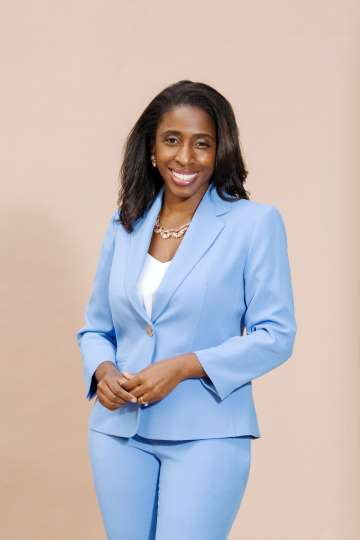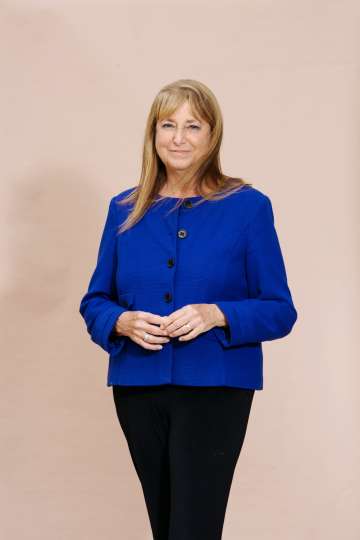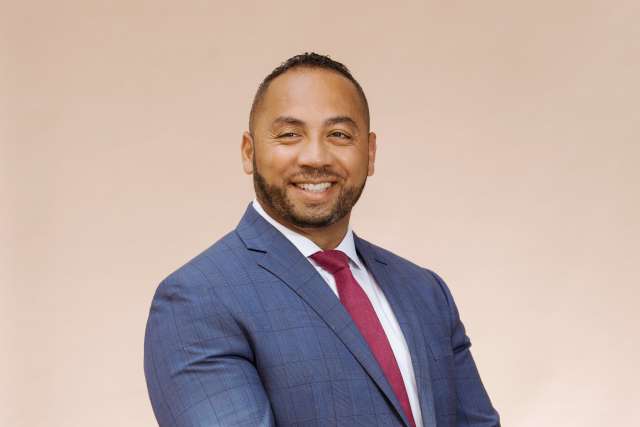During the freedom summer project of 1964 to register black voters in mississippi, the civil rights activist ella baker proclaimed: “until the killing of black men, black mothers’ sons, becomes as important to the rest of the country as the killing of a white mother’s son, we who believe in freedom cannot rest until this happens.”
It is now nearly six decades later, and a year-long pandemic that has wracked the U.S. — and the world — starkly reveals the stubborn endurance of inequity and racism within America and the American health care system. This is clearly evident in the disproportionate rate at which Black, Indigenous, Latino and other marginalized communities have suffered poor health outcomes at the hands of COVID-19.

The data points over this past year are telling: Life expectancy for all groups in the U.S. has decreased due to the pandemic, but the rate of decline is double among Black and Latino people. Black women are three times more likely than White women in America to die in childbirth, even after adjusting for access to care and socio - economic status. Middle-age Black adults are more likely to have higher incidence of chronic conditions and develop comorbidities at an earlier age, and live in medically underserved areas and in communities that are less likely to have sufficient primary care physicians to serve the population.
There is much work that needs to be done to right such historic health care inequities, with their origins in America’s history of slavery and experimentation on enslaved people and continuing through the 20th century’s 40-year-long Tuskegee experiment on Black men with syphilis, and beyond.
In an article this past August in The Lancet, authors from the National Birth Equity Collaborative and local chapters of the American Medical Association wrote that to reduce and eliminate health disparities, health care institutions must move beyond declarative advocacy, acknowledge their role in complacency and take a robust approach to addressing and dismantling structural racism from the inside out.
That is now the task being undertaken by UCLA Hospital System and the David Geffen School of Medicine at UCLA. The two entities together are referred to as UCLA Health, which is laying the foundation for several policies and practices to address implicit bias and structural racism and the ways in which they continue to hold us back. Simultaneously, several individuals and groups across UCLA Health are creating pathways to a culture that is centered on health equity, justice, diversity and inclusion.
ON AUGUST 31, 2020, UCLA HEALTH LAUNCHED ITS FIRST “CONVERSATIONS WITH LEADERSHIP,” a series of online town halls to address and acknowledge steps to advance racial equity. Kelsey C. Martin, MD, PhD, dean of the David Geffen School of Medicine at UCLA, noted that she and other organizational leaders had spent the past months reflecting on how the institution has fallen short and what it must do to improve, with a goal of increasing diversity across the board “to truly change the face of academic medicine.” To which, Johnese Spisso, MPA, president of UCLA Health and CEO of UCLA Hospital System, added, “I hear your concerns, and we must do better on all fronts.” Her goal, Spisso said, is for the organization to become one that upholds the culture of anti-racism and demands equity for employees and patients alike.

The leaders of UCLA Health are working hand-in-hand with members of the UCLA Black Leadership Coalition. Following the killing of George Floyd in Minneapolis and the protests against police violence that erupted across the country this past summer, members of the coalition turned to each other to share in emotional conversations and seek support. Those talks became the foundation for a plan that, ultimately, would evolve into the current health equity, diversity and inclusion (HEDI) framework.
Jerome Crawford, director of performance excellence and interim chief of staff for quality at UCLA Health, says what began as a way for Black leaders to support each other quickly became “us asking how can we give back to UCLA and spur the changes that have been on people’s minds, but never realized.”
Like Crawford, Vernon Goodwin, security director at UCLA Health, has been with the hospital system for more than 20 years. “Sometimes, I’m the only dark face in a room full of leaders making decisions,” Goodwin says. “It’s been that way for years.”
Despite being in a leadership role, making his voice heard has been a challenge, Goodwin says. In some cases, it has taken him presenting his ideas through a “White voice” — having his words put forward by a White colleague — to get the visibility he desires.
During his time at UCLA Health, he says he has experienced and witnessed many microaggressions, the everyday subtle — and often unintentional, but sometimes not — insults and offhand comments posed to historically marginalized groups that too often go unaddressed by managers and human resources personnel. “There was really no way to express how you felt” when something like that happens, Goodwin says. “We did not want to be looked at as the ‘angry Black person’” — mischaracterized as hostile, an implicit bias that is all-too-common in the U.S. workplace
With the HEDI framework, Goodwin, Crawford and the other members of the coalition sought to create changes that are rooted in accountability and transparency to the culture and practices of UCLA Health. The framework consists of an ambitious plan to address past harms and improve UCLA Health’s cultural climate and the health outcomes for patients. Plan action items are monitored by the UCLA Health Equity Council, an accountability and oversight arm comprised of diverse and interprofessional leaders, clinicians and staff.
The council reports to Medell Briggs-Malonson, MD (RES ’09, FEL ’12), MPH, associate clinical professor of emergency medicine and chief of Health Equity, Diversity and Inclusion for the hospital and clinic system, and CEO Spisso.At the start of this year, the UCLA Hospital System Office of Health Equity, Diversity and Inclusion launched a small-group leadership program called Courageous Civility Training to deepen awareness and understanding of HEDI and anti-racism principles and teach UCLA Health leaders how to mitigate implicit bias and microaggressions to build an inclusive workplace rooted in cultural humility and respect.

Dr. Briggs-Malonson has been working with several groups of faculty, staff and trainees “to create a greater sense of a community within our large organization that is centered around specific identities and/or experiences.” The groups will establish their own ideas and develop initiatives to improve the culture of the health system. Additionally, the Office of Health Equity, Diversity and Inclusion has put an emphasis on new policies and expectations for reporting patient and personnel discrimination.
“There has been a history of patients using inappropriate language and behavior toward health care professionals for various reasons, whether it is based on race and ethnicity, gender, language or others,” Dr. Briggs-Malonson says. “Ignoring discriminatory conduct, no matter who commits it, is harmful and must be addressed.”
A broader ambition of UCLA Health is for the organization to earn designation as an anchor institution, a place-based and mission-driven entity that leverages its economic and social capital to invest in the community. Dr. BriggsMalonson says such a designation will further allow the health system to provide clinical care and education through the lens of equity and justice, and it will help to recruit and retain a more diverse workforce. It also will encourage a more thorough review of expenditures, including choices of vendors and community partnerships, and also a deeper focus on climate and environmental justice. “We want to show that we really are an institution that embodies health equity, and to be a beacon in better supporting our communities,” she says.
AS UCLA HEALTH AIMS TO IMPROVE HEALTH DISPARITIES IN LOS ANGELES, the Hospital and Clinic System and the David Geffen School of Medicine at UCLA are finding ways to collaborate through an Anti-Racism Roadmap, the Office of Equity, Diversity and Inclusion, and the Office of Health Equity, Diversity and Inclusion leadership collective. The Office of HEDI partners with the medical school to inform the greater community through webinars such as the inaugural Martin Luther King, Jr. Health Symposium, COVID-related community communications and ongoing townhall discussions with UCLA Health leadership.
Together, they also have created a joint research theme, the Health Equity Translational Social Science Research theme. Led by Rochelle Dicker, MD, professor of surgery and anesthesia, and Helena Hansen, MD, PhD, professor of psychiatry and biobehavioral sciences, the theme promotes equitable care by studying and developing new models to address the impact of social determinants of health, such as education, employment, housing and criminal justice. The intention is to form collaborations among social scientists, life scientists, clinicians and clinical researchers to study the integration of social interventions with medical care — hospital-based violence-intervention programs, for example.
Medical students and residents have been among the most-vocal champions for health care equity, urging the health system to broaden its access to Medi-Cal patients, for example, and the medical school to adjust its admissions metrics to open the doors wider for patients and students from underrepresented communities.
During the August town hall, Michael Mensah, MD, MPH, co-chief resident in the UCLA Department of Psychiatry and Biobehavioral Sciences, shared his motivation to pursue medicine. When his uncle — a father figure to him — died of a heart attack at the age of 35, leaving behind three young children, Dr. Mensah says making sense of his death revealed to him the reality of structural racism. “Sometimes I sensed racism, and sometimes I sensed that people are treated poorly and unfairly but couldn’t really tell if the unfairness qualified as racism. Learning about why my uncle died, and about why he wasn’t really engaged with medical care, made it clear to me that there is structural racism that contributed to his early death.”
Dr. Mensah pressed UCLA Health’s leaders on the importance of hiring more underrepresented minority staff and providers who are familiar with the harmful rhetoric of health care exclusion, as well as for protections for staff and providers who may face racially abusive behavior, and for support of a minority house staff organization to engage resident providers interested in racial justice, something on which he has been working alongside Dr. Lovelee Brown (RES ’20) and other trainees underrepresented in medicine with the Office of Graduate Medical Education.
“There are many efforts going on right now, both formal and informal,” he says. “We’ve been organizing minority trainees into the Minority Housestaff Organization. We want to give residents the platform to tell their stories and have their voices reach leadership’s ears, minds and hearts, so that policy can actually change.”
Medical students, too, have been engaged on many fronts, creating student-led initiatives to promote equity and inclusion in the medical school.
Kathleen Brown, MD (FEL ’86), and Daniel Kozman, MD (RES ’17, FEL ’18), assistant deans for equity and diversity inclusion, credit students and trainees for holding up a mirror to UCLA Health as an organization. “They could be silent, but they’re not. Their voices are important in everything we do,” Dr. Brown says. “We’re looking for ways to infuse this EDI lens throughout every decision and every office.”
To address such concerns, the medical school launched its Anti-Racism Roadmap in July 2020 to serve as a living “scaffolding” for EDI-related efforts, and to hold the institution accountable. The Roadmap builds upon the decade-long work set in motion by Lynn Gordon, MD (RES ’88, FEL ’89), PhD, emeritus senior associate dean for equity, diversity and inclusion. “We have concentrated on education, sponsorship and mentorship, and we have also done a lot of talking. But without the accountability piece,” she says, “there’s no comprehensive and significant change.”
Clarence H. Braddock III, MD, MPH, vice dean for education in the David Geffen School of Medicine at UCLA, is executive director of the Roadmap. An essential part of his role, he says, is to “delve more deeply into what things we actually should be doing to move the needle on recruitment, retention, climate, minority tax, and a number of other issues.”
Similar to the HEDI strategic plan, the Anti-Racism Roadmap has priority areas that have been created in collaboration with the medical school’s Faculty Equity and Diversity Inclusion Committee, the Staff Racial Justice Task Force, the Black, Latinx, and Native American Faculty Collective and the broader community of trainees, staff and faculty. From data accountability, recruitment and retention, and curriculum enhancement to admissions selection and research, the Roadmap spans every area of the school.
“In this Roadmap, we’re trying to reimagine how we think about change,” Dr. Braddock said during the medical school’s inagural “Leadership Dialogue on Anti-Racism” town hall in August 2020. Dr. Braddock says the medical school seeks to create change in a more organic and collaborative way, rather than following a hierarchical structure, which, as he says, “can sometimes represent barriers to real change, particularly in the area of racism.”
The Roadmap has emphasized five areas that will be the focus for 2021 and beyond: anti-racism training; a suite of tools such as book recommendations to continue conversations outside of training; sessions with current medical students to uncover racism and inequality in the learning environment, called “Driving Real Change in the Learning Environment Initiative”; transparency in metrics on diversity, culture and climate; and fundraising initatives to further support these efforts.
Getting the entire institution involved has been key, Dr. Gordon says. “It’s not just our colleagues who come from under-represented groups; it’s everybody’s responsibility to fix the problem,” she says.
When it comes to trainee recruitment, “We were struggling to figure out what success looked like,” says Christina Harris, MD, assistant designated institutional official for equity and diversity inclusion in Graduate Medical Education, associate program director of the Internal Medicine Residency Program and associate professor of clinical medicine. Students, she says, were “voting with their feet” and not applying to the program. Then “a light bulb went off,” and she realized it was impossible to engage in residency, diversity, education and recruitment in a vacuum; they were so intertwined that they had to be addressed together, she says.
To recruit students from diverse backgrounds, the school first needed to create a space for them to feel “valued and recognized,” Dr. Harris says. She and her colleagues Keith C. Norris, MD (FEL ’85), PhD, professor of medicine, and Teresa Seeman, PhD, professor of medicine and epidemiology, got together to develop a broader proposal to address the infrastructure of EDI and amplify recruitment efforts.
Elizabeth Asfaw, MD (RES ’21), and Dr. Lovelee E. Brown, inaugural chief resident of equity, diversity and inclusion for the Department of Internal Medicine, together developed microaggressions training for residents and implicit-bias training for faculty. The Department of Medicine Office of Equity, Diversity and Inclusion launched a number of new fellowship programs and created a health-equity pathway for underrepresented first-year medical students to receive specialized education and be involved with research. Other initiatives include a health-equity curriculum focus for residents, a LGBTQ+ health series and a mentorship network connecting residents with medical students.
In 2019, Dr. Brown and Farah Abdi, MD (RES ’20), founded the Road to Residency Conference, an event for underrepresented medical students preparing for residency match. The event provided an opportunity for students to network with faculty and residents of color; learn tips for interviewing and how to excel in both school and clinically with patients; and receive advice on how to develop research projects. As she took part in the screening process, Dr. Brown says that she “noticed student names from institutions we typically don’t get applicants from.” Later, she saw their names on the attendee list for the Road to Residency. “It was refreshing to see the event make a positive impact for our underrepresented student community in that way,” she says.
WITH EVERYTHING THAT HAS TAKEN PLACE OVER THIS PAST YEAR, there is a “seismic shift” happening within the school of medicine, UCLA Health and culture at large, Dean Martin says. “The old rules of society, they’re changing, and they’re melting away, which is, to me, a wonderful thing.”
But while the pandemic and the display of numerous social injustices have helped to catalyze this work and bring together people who care about issues of equity, diversity and inclusion, “some things have changed, but a lot has not,” Dr. Norris says. “There are more conversations taking place here, and elsewhere, than ever before. I would say that suggests there is the potential for change, but I also think there is a naivety around how deeply entrenched structural racism is, how clever the narratives have evolved and how clever the ideology is.”
Dr. Braddock agrees. “People are in the process of trying to reimagine what the word ‘racist’ means, and to distinguish it from ‘bias’ and ‘discrimination,’” he says. “There is a very important new understanding of racism as something that everyone is consciously or unconsciously supporting, and of being racist unless they’re consciously trying to dismantle it and be anti-racist.”
Such conversations are taking place at every level of the institution — driven in some cases from the bottom up, and in others flowing from the top down. From whichever direction change is initiated, one thing remains clear: “We need to change the overall culture,” says John C. Mazziotta, MD (RES ’81, FEL ’83), PhD, vice chancellor for UCLA Health Sciences and CEO of UCLA Health. “Today we listen. Tomorrow we listen. And each day going forward, we take what we hear and move into action together.”


